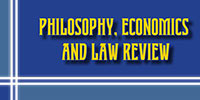Iuryi KHODANYCH
KHODANYCH I. (2023), “RELIGION” IN THE PHILOSOPHY OF I. KANT. PHILOSOPHY, ECONOMICS AND LAW REVIEW. Volume 3, no. 1, 7-17
DOI: 10.31733/2786-491X-2023-1-7-17
ABSTRACT. The purpose of the study is to clarify the main issues of Kant’s doctrine of the phenomenon of religion through the prism of analyzing its aspects such as: the essence of religion; the relationship between religion and morality; the place of God in religion; types of religions; the relationship between religion and faith; the impact of religion on human development. The scientific novelty of the study lies in the implementation of a comprehensive, albeit brief outlining the fundamental components of the phenomenon of religion as interpreted by I. Kant.
The author comes to the conclusion that «religion» in Kant’s interpretation means the fulfillment of one’s obligations by a person, which, due to his connection with God, acquires the status of divine commandments. This sphere is deprived of irrational, sensual components and strengthens the moral law in man. The goal of religion is to realize perfection, a perfect state of moral action through connection with the divine essence. Kant seeks to formulate certain “criteria” of true religiosity, in particular: imbued with a rational component; finding and following moral duties as divine commandments; the absence of collective forms of service and ritualism. As well as religion, faith in Kant’s interpretation is also of a moral nature. True moral faith, on the one hand, implies belief in the existence of God as a holy lawgiver, guardian of the human race and a righteous judge, and on the other hand, it is a belief in the possibility of becoming pleasing to God by leading a good life. One of the tasks of religion is the moral improvement of a person who leads to a position of pleasing God, a person’s dignity before Him. The idea of such improvement is inherent in the mind itself and is achieved through internal moral compulsion (fulfillment of duties as divine commandments). Perfection is not God’s assistance, but the result of merit, of human actions in the fulfillment of the moral law.
Keywords: morality, faith, God, moral law, human improvement, reason.
References
- Firestone, C., Jacobs, N., & Joiner, J. (eds.). (2017). Kant and the Question of Theology. Cambridge: Cambridge University Press, 260 p.
- Godlove, T. (2014). Kant and the Meaning of Religion. New York: Columbia Univ. Press, 245 p.
- Horokholinska, I. (2012). Fenomen relihii v systemi aksiolohichnykh idei Kanta: lohika stanovlennia ta shliakhy istorychnykh retseptsii [The phenomenon of religion in the system of axiological ideas of Kant: the logic of establishment and ways of historical reception]: avtoref. of Doctor’s thesis. Chernivtsi, 20 p. [in russ.].
- Ishmakova, A. (2012). Problema istinnoi religii v uchenii Immanuila Kanta [The problem of true religion in the teachings of Immanuel Kant]. Culture. Spirituality. Society, 1, pp. 124-137. [in russ.].
- Kant, I. (1994). Religiya v predelakh tolko razuma [Religion within the mind] / Writings in 8 vol. V. 6. pp. 5-223. [in russ.].
- Kitaeva, L. (2005). Filosofiya religii Germana Kogena [Herman Cohen’s philosophy of religion]: avtoref. of Doctor’s thesis, 17 p. [in russ.].
- Lugovoi, S. (2003). Interpretatsiya Biblii v prakticheskoi filosofii I. Kanta [Interpretation of the Bible in the practical philosophy of I. Kant]: avtoref. of Doctor’s thesis, 18 p. [in russ.].
- Matyash, T. (2016). Moralnaya filosofiya I. Kanta i khristianstvo [Moral philosophy of I. Kant and Christianity]. Humanitarian of the South, 1, pp. 86-97. [in russ.].
- Myasnikov, A. (2007). Kant i revolyutsiya v religii [Kant and the revolution in religion]. Proceedings of Humanities, 4, pp. 7-11. [in russ.].
- Oizerman, T. (1993). Nravstvennoe soznanie i religiya v sisteme I. Kanta [Moral consciousness and religion in the system of I. Kant]. Kantian collection, 17, pp. 3-11. [in russ.].
- Palmquist, S. (2016). Comprehensive Commentary on Kant’s Religion within the Bounds of Bare Reason. John Wiley & Sons, Inc., 640 p.
- Palmquist, S. (1992). Does Kant reduce religion to morality? Kant-Studien, 83, pp. 129-148.
- Pechurchik, Yu. (2009). Filosofiya Kanta i religiya otkroveniya [Kant’s philosophy and the religion of revelation]. Bulletin of the Christian Humanitarian Academy, 2, pp. 106-115. [in russ.].
- Pera, M. (2012). Kant on politics, religion, and secularism. Universal Rights in a World of Diversity. The Case of Religious Freedom, Pontifical Academy of Social Sciences, Acta, 17, pp. 546-577.
- Petrescu, A. (2014). The idea of God in Kantian philosophy. Procedia – Social and Behavioral Sciences, 163, pp. 199-203.
- Pivovarov, D. (2014). Immanuil Kant: gnoseologiya i filosofiya religii [Immanuel Kant: epistemology and the philosophy of religion]. Bulletin of the Institute of Economics, Management and Law, 1, pp. 76-88. [in russ.].
- Shamshiri, B., Karimi, M., Shahsani, S. & Naghibi, S. (2018). Reviewing Kant’s view of God’s existence and status in religion. Revista Publicando, 15, pp. 199-215.
- Sudakov, A. (2009). Mezhdu veroi serdtsa i blagochestiem razuma: kak Kant ne stal filosofom otkroveniya [Between the faith of the heart and the piety of the mind: how Kant did not become a philosopher of revelation]. Kantian collection, 1, pp. 39-53. [in russ.].
- Tytarenko, V. (2010). Spivvidnoshennia morali i relihii u filosofskykh vchenniach I. Kanta ta G.V.F. Hegelia [The relationship of morality and religion in the philosophical teachings of I. Kant and G.V.F. Hegel]: avtoref. of Doctor’s thesis. Kyiv, 20 p. [in Ukr.].
- Wood, A. (2020). Kant and religion. Cambridge: Cambridge University Press, 250 p.
